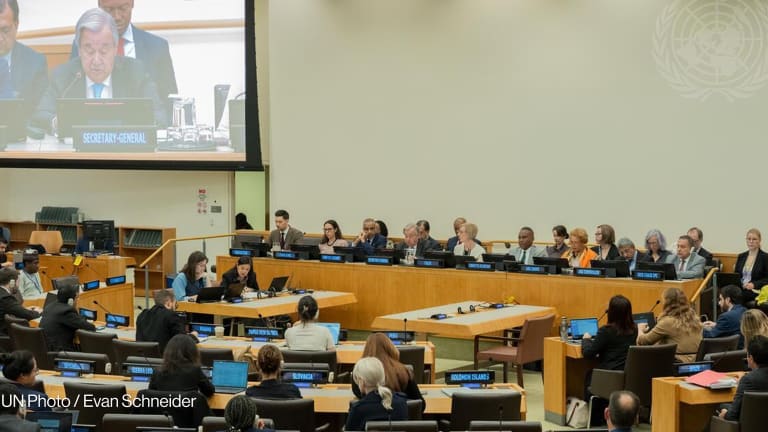
WASHINGTON — Last month, employees at the National Democratic Institute voted to join a union, a decision aimed at improving their bargaining power over a range of workplace benefits — including some unique to the international development industry.
As a union workforce, NDI employees will negotiate vacation, sick leave, and health care, as well as international travel policies, often to insecure locations where NDI supports democratic institutions.
The move to unionize by an international development organization is a rare one — even for organizations that support labor movements in other countries. It speaks to a growing awareness among development professionals that being mission-driven does not have to mean foregoing some of the options available to improve workplace conditions.
Representatives from NDI approached the Office and Professional Employees International Union Local 2 to explore the possibilities of unionization in the spring. The union represents approximately 7,000 people in the District of Columbia, Virginia, and Maryland.
“Over the years, there had been issues at the workplace that they had attempted to address by approaching individual managers [or] human resources, and felt that their issues were either partially addressed or frankly simply weren’t addressed at all,” said Jessica Maiorca, who works for OPEIU Local 2 as a staff representative.
“Then they started approaching as a few people or a larger unit, realized that wasn’t actually working, and figured, well, it seems like it’s going to take a collective to get any sort of change, and so the idea of forming a union was a natural next step,” she said.
NDI’s unionization campaign moved relatively quickly. Employees leading the effort developed an outreach plan to approach colleagues, seeing if they supported joining a union. Those that did were directed to fill out a union card.
“What we found [wa]s that an overwhelming number of people were quite supportive and were willing to sign cards that are essentially expressions of support,” Maiorca said.
Once they had a “large majority” of cards, employees approached their management and informed them of their desire to form a union.
“As you can imagine, they were not thrilled,” Maiorca said.
NDI declined to voluntarily recognize the union, opting instead to go through with a formal elections process, Maiorca said. NDI and Local 2 worked with the National Labor Relations Board to organize the election, which was conducted via mail from July 3-31. Approving a union requires 50 percent of staff plus one person to vote in favor, and 85 percent of the unit voted for unionization.
“What is so perfect about this particular campaign at NDI is that unions are inherently democratic. They are a building block of democracy in any country,” Maiorca said.
“In a way, we were saying it would be a great marketing opportunity for NDI to say ‘we’re living our mission,’ which is to promote democracy about the world,” she added.
NDI’s management team declined an interview request to discuss the unionization effort, but President Ken Wollack wrote in a statement to Devex that, “as members of a democracy organization, we respect and welcome thoughtful, transparent, inclusive efforts to improve our workplace. NDI also recognizes the right of all workers, should they choose, to organize.”
NDI is one of the four core grantees of the National Endowment for Democracy. Solidarity Center, another core NED grantee, is also unionized with OPIEU Local 2.
NDI staff would not comment publicly on the unionization effort, saying through a union representative that, “the staff involved with the union organizing effort decided that, in light of the upcoming negotiation process, they would prefer not to speak to the press about the issue at this time.”
There may be a variety of reasons why it is not common for employees of international development organizations to unionize, according to Maiorca. Part of it is thinking that employees should have to sacrifice working conditions and benefits because they work for a nonprofit.
“The other part of that myth is that if you work for a nonprofit, that organization does not have money,” Maiorca said. “That’s not necessarily true.”
The fact that many organizations based in Washington, D.C., employ a large number of contractors, rather than permanent employees who receive benefits, may be another reason for the relative scarcity of unionized development organizations. Under the U.S. National Labor Relations Act, contractors — who may also not receive paid vacation, sick leave, health care, retirement contributions and maternity leave — are not included in a union’s unit.
Issues related to nonpermanent employees are one of the things NDI employees will be discussing with management. Many nonprofits use contractors, consultants, and project employees for extended periods of time rather than full-time employees, because it can save money that would otherwise be spent on benefits, Maiorca said.
Union contracts can limit the use of contractors and other temporary workers, forcing organizations to hire them permanently or only use them for limited amounts of time. They don’t do this because they’re opposed to contractors, Maiorca said, but because the union believes those workers should also be entitled to benefits and worker protections that come with full-time employment and union membership.
Common issues that unions typically negotiate with management include salaries, breadth and cost of health insurance, retirement savings contributions, and access to professional development opportunities. An issue more specific to international development work that Maiorca expects will be discussed with NDI management is the arrangements around international employee travel. For example, they might seek to determine whether employees are entitled to a day off before or after they go on a work trip, and what the access to health care is while traveling.
When managers at other organizations see a successful unionization effort at one of their peer organizations, it can also be a kickstarter for efforts to improve employee benefits and wages to pre-empt employees’ decision to form a union, according to Maiorca.
“They will try to quash any resentment or unhappiness with their workplace by improving conditions,” she said.
Union negotiations can vary in length, from a few months to up to a year and a half, Maiorca said. NDI and union representatives have not yet begun negotiations for their union contract, a process which is expected to start sometime in the fall.








